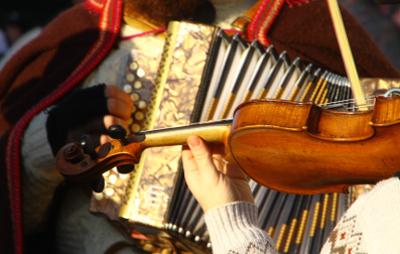New research grant to recreate music from the past

OU researchers have received funding to construct a digital historical archive of the European musical world by using innovative artificial intelligence.
The OU has received approximately £377,000 as a partner in the Polifonia project to organise 10 pilot studies to address how to capture, preserve, manage and interact with musical heritage. Memory institutions, scholars, and citizens will be able to navigate, explore, and discover multiple perspectives and narratives about European Musical Heritage.
Funded by the European Commission under the H2020 Framework Programme, the project, co-ordinated by the University of Bologna, will develop methods and tools to help understand the evolution of European musical heritage in space and time.
Web portal of musical heritage
The OU team is led by Dr Enrico Daga, Research Fellow in the OU’s Knowledge Media Institute (KMi), who is also the Polifonia Technical Director. The team will contribute to build a Knowledge Graph of European Musical Heritage and develop a Web Portal for exploring the wealth of musical heritage. The resource will be available in 2022 as an alpha version, with incremental releases until the end of the project in April 2024.
Perceiving music with your body
Dr Daga will work with Dr Paul Mulholland and Dr Simon Holland in the OU’s Music Computing Lab who will to co-design, develop and evaluate interactive technology, including wearables and haptics, to enable D/deaf and disabled people to engage as musical participants, audience members and performers. The work, in collaboration with ‘The Stables’, will enable people to "feel" music through wearable technology and participate in live performances. Technology will also be developed to allow people to explore musical archives through gesture and movement.
Pilots to recreate the past
The role of the OU Music Department, led by Dr Helen Barlow, is to use the OU’s track record in music to develop two pilots. One on Music experiences in childhood will draw on letters, memoirs and travel writing in the public domain as sources for adult reflections on music heard in childhood. The other, People and music, exploring their encounters over centuries, will provide a web tool that will enable the visualisation of meetings between people in the musical world in Europe from c.1800 to c.1945, also relying on information extracted from books in the public domain such as biographies, memoirs and travel writing, and open-access databases.
Dr Daga said:
“Recent advances in artificial intelligence and knowledge representation allow us to explore our musical heritage as a cohesive whole: a vast Knowledge Graph. Music scholars will have the opportunity to study the cultural and historical phenomena about music on an unprecedented scale, leading to exciting new insights and discoveries.”
Related content
Quarterly Review of Research
Read our Quarterly Review of Research to learn about our latest quality academic output.

Contact our news team
For all out of hours enquiries, please telephone +44 (0)7901 515891
